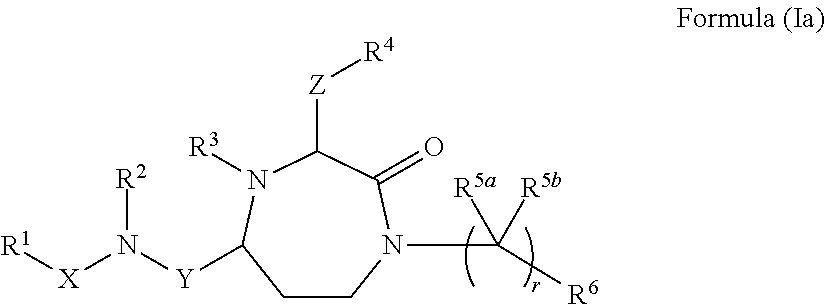Methods of modulating the activity of the mc1 receptor and treatment of conditions related to this receptor
- Summary
- Abstract
- Description
- Claims
- Application Information
AI Technical Summary
Benefits of technology
Problems solved by technology
Method used
Image
Examples
example 1
General Procedure—Weinreb Amide Formation
[0373]
[0374]BOP reagent (100 mmol) and diisopropylethylamine (DIPEA) (100 mmol) is added to a stirred solution of the amino acid (1) (100 mmol) in dichloromethane (DCM) (100 mL). The solution is then stirred at room temperature for 10 mins, before addition of a premixed solution of N,O—dimethylhydroxylamine hydrochloride (100 mmol) and DIPEA (100 mmol) followed by stirring at room temperature overnight. The DCM is then removed by rotary evaporation and the residue taken up in ethyl acetate (EtOAc) (200 mL). The organic phase is then washed with 1N HCl (3×100 mL), H2O (3×100 mL), saturated NaHCO3 aqueous solution (3×100 mL) and brine (1×10 mL). The organic phase is then dried (MgSO4) and the EtOAc removed to give the Weinreb amide (2) as a white solid or an oil.
example 2
General Procedure—Vinyl Grignard Addition to Weinreb Amide to Form α,β-Unsaturated Ketones of Formula (3)
[0375]
[0376]To the Weinreb amide (2) (15 mmol) in DCM (10 mL) at 0° C. is added vinyl magnesium bromide (45 mmol) in THF (45 mL). The reaction is stirred for 2 hrs and monitored by HPLC. The reaction is then quenched by adding it to a mixture of ice and 1M HCl (200 mL). The aqueous mixture is extracted with DCM (3×100 mL) and the organic layers combined and washed with 1M HCl (2×200 mL) and H2O (3×100 mL). The organic phase is dried (MgSO4) to provide a solution of the α,β-unsaturated ketone (3). The α,β-unsaturated ketone (3) may be isolated by rotary evaporation or it may be used in solution without further purification. If the intention is to use the α,β-unsaturated ketone (3) in solution the volume is reduced to 100 mL by rotary evaporation and stored for later use.
example 3
General Procedure—Conjugate Addition of Amine to α,β-Unsaturated Ketones of Formula (3) to Produce Compounds of Formula (4)
[0377]
[0378]To the amine W—NH2 (7.4 mmol) in DCM (10 mL) is added a solution of the α,β-unsaturated ketone (3) (5.7 mmol) in DCM (50 mL). The solution is stirred at room temperature for 15 mins, or until analysis indicates that all of (3) has been consumed. The solution of compound (4) is immediately used without purification for the subsequent reaction.
PUM
| Property | Measurement | Unit |
|---|---|---|
| Volume | aaaaa | aaaaa |
| Time | aaaaa | aaaaa |
| Time | aaaaa | aaaaa |
Abstract
Description
Claims
Application Information
 Login to View More
Login to View More - R&D
- Intellectual Property
- Life Sciences
- Materials
- Tech Scout
- Unparalleled Data Quality
- Higher Quality Content
- 60% Fewer Hallucinations
Browse by: Latest US Patents, China's latest patents, Technical Efficacy Thesaurus, Application Domain, Technology Topic, Popular Technical Reports.
© 2025 PatSnap. All rights reserved.Legal|Privacy policy|Modern Slavery Act Transparency Statement|Sitemap|About US| Contact US: help@patsnap.com



